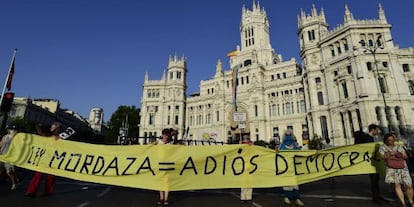Madrid tries to pass off responsibility for collecting fines from “gag law”
Leftist mayor sends sanctions to the central government, which has sent them right back


Madrid City Council is trying to avoid charging fines imposed by the municipal police on violators of the new Citizen Safety Law, a controversial piece of legislation sponsored by the central government of Prime Minister Mariano Rajoy.
Among its measures, the legislation – which has been dubbed the “gag law” by critics – prohibits demonstrations near Spain’s Congress and Senate buildings in Madrid, impedes members of the public from filming the actions of police officers, and gives the police powers to fine anyone who refuses to break up a public demonstration – including a peaceful sit-in – after “the relevant authority” has ordered it.
If the city delays sending notice, it could end up not collecting the money
The Madrid department of health, safety and emergencies sent the fines in question along to the central government delegation in Madrid three weeks ago. Despite the lost revenues for city coffers that this entails, officials claimed they lack the power to enforce these sanctions.
But the government has sent them back this week, reminding local authorities that they are responsible for fining violators and for collecting the money.
The delegation’s note also makes the point that if the deadlines for sending notice expire, it will be the city’s sole responsibility.
Municipal sources now say that their “legal doubts” have been cleared up and that they are sending notice to violators. These same sources added that there is still “enough time” to deal with the fines because the deadline on some of them is a year.
But minor violations, which carry fines of €100 to €600, have a six-month deadline. If the city delays sending notice, it could end up not collecting the money.
Underlying this ping-pong game is the fact that the new council in Madrid, a left-wing bloc led by Mayor Manuela Carmena, disagrees with the Citizen Safety Law, which was first introduced by the ruling center-right Popular Party (PP) in November 2013. Carmena’s party, Ahora Madrid, was born from street protests against the central government that began to spread throughout Spain in May 2011, a movement that was dubbed 15-M.
The initial wording of the draft law met with serious criticism from opposition parties, civil society groups and top legislative bodies, which found parts of it to be illegal. The bill’s focus on breaking up street protests led critics to say that the legislation seemed tailor-made for the PP government to quell public displays of citizen discontent over its handling of the economic crisis and the corruption cases coming to light.
The text that finally saw the light on July 1 of this year was considerably toned down, but still included fines for many public activities.
English version by Susana Urra.
Tu suscripción se está usando en otro dispositivo
¿Quieres añadir otro usuario a tu suscripción?
Si continúas leyendo en este dispositivo, no se podrá leer en el otro.
FlechaTu suscripción se está usando en otro dispositivo y solo puedes acceder a EL PAÍS desde un dispositivo a la vez.
Si quieres compartir tu cuenta, cambia tu suscripción a la modalidad Premium, así podrás añadir otro usuario. Cada uno accederá con su propia cuenta de email, lo que os permitirá personalizar vuestra experiencia en EL PAÍS.
¿Tienes una suscripción de empresa? Accede aquí para contratar más cuentas.
En el caso de no saber quién está usando tu cuenta, te recomendamos cambiar tu contraseña aquí.
Si decides continuar compartiendo tu cuenta, este mensaje se mostrará en tu dispositivo y en el de la otra persona que está usando tu cuenta de forma indefinida, afectando a tu experiencia de lectura. Puedes consultar aquí los términos y condiciones de la suscripción digital.








































